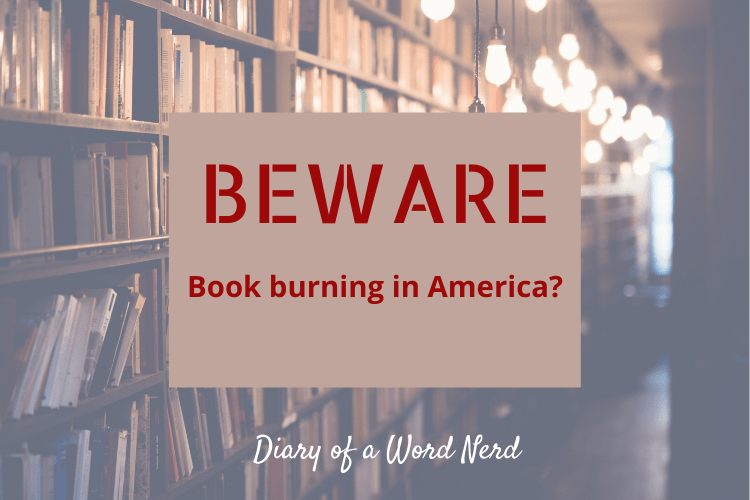Book burning is something that happened long ago, in Nazi Germany before WWII, so that Hitler could control what German people read and thought. Nothing like that would ever happen in America in the 21st century, right?
We’ll see.
Last week, in my home state of Virginia, two elected officials, members of the Sponsylvania County School Board, suggested that two books they found offensive should not just be removed from school libraries. They wanted them burned.
According to the Free Lance Star, board member Rabih Abuismail said, ““I think we should throw those books in a fire,” and board member Kirk Twigg, said he wants to “see the books before we burn them so we can identify within our community that we are eradicating this bad stuff.”
In the end, the board voted 6-0 to remove books with “sexually explicit” material from library shelves and discussed reviewing how books are chosen for school libraries. No burning has taken place – yet.
When I heard this story, a chill passed through me. Burning books? That’s what we are devolving to now? I understand that parents may have concerns about the content of books, and I respect that some people might be offended by the content of Toni Morrison’s Beloved or Salinger’s Catcher in the Rye. I’m all for transparency about book content and the freedom to choose alternatives. However, the recent rise in calls for book removal, and this specific instance of calling for book burning, have me very concerned about where we are heading in this country, and how politics is seeping into the once mundane and, dare I say, boring world of school board meetings.
Some history on book burning
In 1933, university students in towns across Germany burned over 25,000 books by Jewish and/or blacklisted authors: Sigmund Freud, Albert Einstein, Hellen Keller, Ernest Hemingway. At the time, the German minister of Public Enlightenment and Propaganda, Joseph Goebbels, told thousands of Germans that “the era of extreme Jewish intellectualism is now at an end. … The future German man will not just be a man of books, but a man of character. It is to this end that we want to educate you. … And thus you do well in this midnight hour to commit to the flames the evil spirit of the past.”
The American media expressed some shock, but one journalist, New York Herald Tribune columnist Walter Lippmann, took the book burnings as an ominous predictor of what was to come. He said, “”These acts symbolize the moral and intellectual character of the Nazi regime, for these bonfires are not the work of schoolboys or mobs but of the present German Government … The ominous symbolism of [this act and] these bonfires is that there is a government in Germany which means to teach its people that their salvation lies in violence.”
And so it did.
Books have been challenged and banned for a long time. Visit the American Library Association’s website to see books that have been frequently challenged and why. (I was shocked to learn from this page that as recently as 2001, books by J.R.R. Tolkein were burned in New Mexico because they were deemed “satanic”!) What’s new is the coordinated effort behind the removal of materials. We’re hearing stories about challenges across the country in places like Texas and Kansas. There were even calls for removal of materials at the last school board meeting in my own little old Wythe County.
According to Nora Pelizzari, a spokeswoman at the National Coalition Against Censorship, “What has taken us aback this year is the intensity with which school libraries are under attack.” She added that the apparent coordination of the effort sets it apart: “Particularly when taken in concert with the legislative attempts to control school curricula, this feels like a more overarching attempt to purge schools of materials that people disagree with. It feels different than what we’ve seen in recent years.” (From The Washington Post)
What concerns me
The world is very different now compared to 1933. Books are ubiquitous and come in many forms – paperback, e-book, audiobook. Posts about books fill Instagram and Twitter. Tik Tok videos promote books via Book-Tok. I’m not worried that we won’t have access to books. I’m worried about the mindset behind the desire to limit access.
Choosing to review, and perhaps even restrict books. for sexually explicit content is one thing. Although, I must point out there is more sex, as well as violence, profanity, and nudity, on the Internet than in any book. Also, books usually present edgy content in context – showing how characters are influenced and affected by it. You often don’t get context on social media. But, you can’t take down You Tube, much less burn it. So people are targeting something tangible – books.
Unfortunately, I doubt this line will end with “sexually explicit” books. In October, a lawmaker in Texas started an investigation into books that “contain material that might make students feel discomfort, guilt, anguish, or any other form of psychological distress because of their race or sex or convey that a student, by virtue of their race or sex, is inherently racist, sexist, or oppressive, whether consciously or unconsciously.” That’s getting into very gray, and very political, water.
And we, my fellow book lovers, need to be paying attention. We can take inspiration from Helen Keller. When she learned university students in Germany were planning on burning her books, she wrote an open letter to them that said:
Have you heard of any calls for book burning? What do you think of the current enthusiasm behind reviewing school materials?
Thanks for getting nerdy with me!






Julia,
I don’t know how I missed this post from November. It is a very timely post even up here in WI. We first went through an attempt for a political group to try and unseat and replace members of our non-partisan school board and now they are going after books. They have objected to a book on the freshman list at the local high school. Tis is when the student and their parent have three options – read the book, read the book with some sections removed, or read an alternate book. I agree with both points that have been raised. There is far more objectionable material found on the phone in each child’s possession and that there is no better way to get a teenager to read a book than for the adults to find it objectionable.
Thanks for sharing, Carol. It is very unfortunate. I feel like energy is being focused on the wrong things, and in such negative spirit.
Where I live there is a recent and ongoing call to ban certain books in our county library! They are all books with references to sex or gender identification. “They” even filed charges to have the library director arrested for solicitation! A children’s magaician was scheduled to entertain at an event last summer. Someone found out she was transgender and threatened her life. Needless to say, she cancelled her appearance. I was and am still, appalled at such rhetoric.
Yes I am old. I graduated in 1967. When I was in school if a book was deemed unfit for high school library, it was a sure bet we would get a copy somehow and read it.